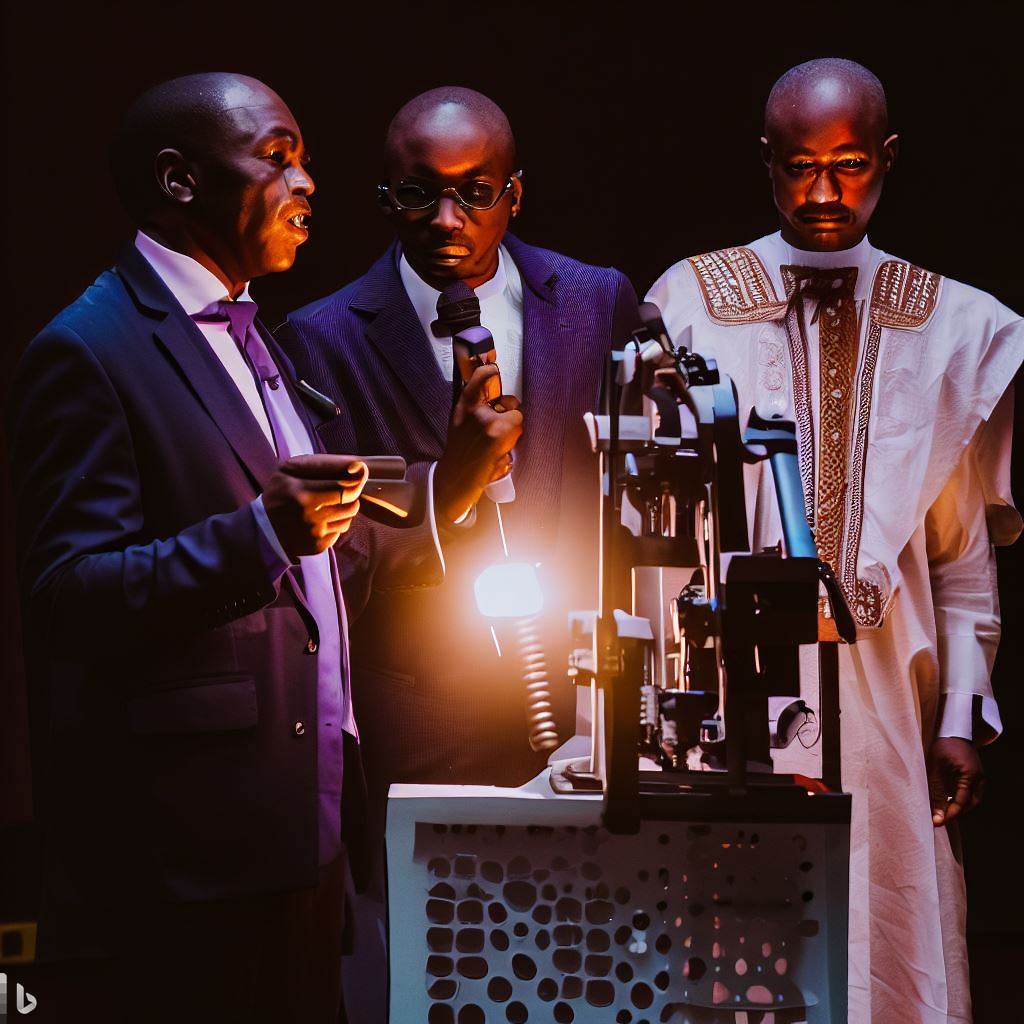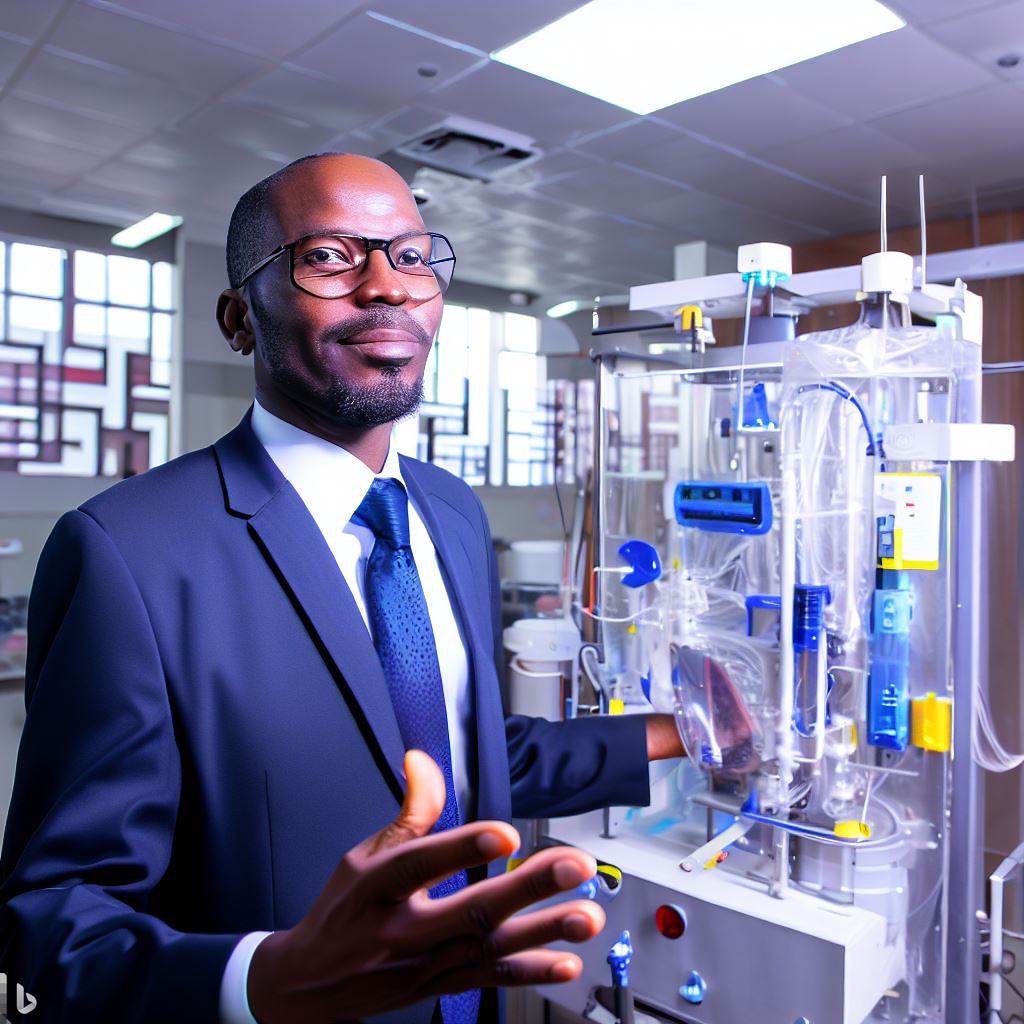Introduction
Biomedical engineering in Nigeria is rapidly burgeoning, amalgamating engineering principles with medical sciences to advance healthcare.
This field encompasses the creation, evolution, and upkeeping of medical devices, coupled with the application of engineering methodologies in healthcare delivery.
Underscoring the pioneers in this sphere is imperative for several compelling reasons.
Firstly, it venerates their monumental strides in propelling the evolution of biomedical engineering in Nigeria, thereby forging pathways for forthcoming breakthroughs.
Secondly, it kindles inspiration among burgeoning biomedical engineers, exemplifying the heights attainable within this nascent domain.
Lastly, it amplifies the significance of biomedical engineering in addressing the healthcare quandaries prevailing in Nigeria.
These visionaries have indelibly marked diverse subfields, spanning medical imaging, prosthetics, biomaterials, and healthcare technology management.
Their inventive research and pragmatic enactments have ushered in an epoch of transformation in Nigerian healthcare.
By delving into their feats, we illumine the vast potential and prospects that biomedical engineering holds in the pursuit of addressing the nation’s healthcare prerequisites.
Moreover, the spotlight on these pioneers sparks awareness about the field and fosters synergistic collaborations among academia, industry, and healthcare institutions.
This nurturing milieu germinates the seeds of pioneering technologies and solutions, poised to augment healthcare quality and enhance patient well-being across Nigeria.
In the sections that ensue, we shall delve deeply into the narratives of these pioneers, unveiling their accomplishments, the adversities surmounted, and the enduring influence they have etched onto the tapestry of biomedical engineering in Nigeria.
History of Biomedical Engineering in Nigeria
A. Origins and development of biomedical engineering in the country
- Biomedical engineering emerged in Nigeria in the late 1970s.
- The field initially focused on medical equipment repair and maintenance.
- Professionals from different disciplines, such as medicine, engineering, and physics, contributed to its growth.
- The Nigerian Medical and Dental Council (NMDC) recognized biomedical engineering as a specialty in 1992.
- Universities started offering undergraduate and postgraduate programs in biomedical engineering.
B. Growth and advancements over the years
- Biomedical engineering in Nigeria has experienced significant growth and advancements.
- The establishment of the Biomedical Engineering Society of Nigeria (BMESN) in 2003 fostered collaboration and knowledge sharing.
- Increased research efforts led to breakthroughs in areas like medical imaging, prosthetics, and telemedicine.
- Partnerships with international organizations facilitated technology transfer and skill development.
- Biomedical engineering professionals in Nigeria have contributed to global scientific advancements.
C. Challenges faced by the field in Nigeria
- Limited funding for research and development hampers progress in biomedical engineering.
- Inadequate infrastructure and lack of modern equipment pose challenges for practitioners.
- Brain drain, with skilled professionals leaving for better opportunities abroad, affects the workforce.
- Insufficient collaboration among researchers, healthcare providers, and industry stakeholders slows innovation.
- Regulatory gaps and inadequate policies hinder the effective integration of biomedical engineering into healthcare systems.
In spite of these challenges, the field of biomedical engineering in Nigeria continues to make significant strides.
Initiatives are actively being pursued to tackle these challenges and establish an environment conducive to growth.
Through the augmentation of government funding and the cultivation of partnerships with the private sector, the prospects for research and development can be significantly amplified.
Moreover, the establishment of more specialized training programs and centers of excellence can further enhance skill acquisition.
In addition, collaboration among stakeholders, both local and international, is crucial for facilitating knowledge exchange and technology transfer.
Furthermore, the implementation of improved regulations, standards, and policies will ensure the safe and efficient use of biomedical engineering in healthcare.
In the long run, sustained dedication and backing will empower the trailblazers in the field of biomedical engineering in Nigeria to drive innovations capable of revolutionizing healthcare provision both domestically and internationally.
Read: Diversity in Biomedical Engineering: Nigeria’s Perspective
Pioneers of Biomedical Engineering in Nigeria
A. Dr. Ezekiel Ajibesin
- Background and education: He has a strong background in biomedical engineering and holds a Ph.D. in the field.
- Contributions to the field: He has made significant contributions to the development of medical equipment and devices in Nigeria.
- Achievements and recognitions: Dr. Ajibesin has received numerous awards and recognition for his outstanding work in biomedical engineering.
B. Dr. Olawale Sulaiman
- Background and education: He is a highly accomplished biomedical engineer with a solid educational background.
- Notable research and inventions: He has conducted groundbreaking research and has invented several medical devices that have had a significant impact in the healthcare sector.
- Impact on healthcare in Nigeria: Dr. Sulaiman’s innovations have greatly improved healthcare delivery and accessibility in Nigeria.
C. Eucharia Nwaichi, M.Sc., Ph.D.
- Background and education: She has a strong educational background in biomedical engineering and holds a Ph.D. in the field.
- Work in medical imaging technology: She has made significant contributions to the field of medical imaging technology, particularly in the development of advanced imaging techniques.
- Efforts in improving access to healthcare: Dr. Nwaichi has been actively involved in initiatives aimed at improving access to quality healthcare services in Nigeria.
The vanguards of biomedical engineering in Nigeria have left indelible marks through their noteworthy contributions.
Dr. Ezekiel Ajibesin, fortified by his robust educational foundation and specialized proficiency, has played a pivotal role in the advancement of medical equipment and devices within the nation.
The commendable accomplishments of Dr. Ajibesin have garnered extensive acclaim and jubilation.
Dr. Olawale Sulaiman has also left an indelible mark in the field of biomedical engineering.
By means of his research and inventions, he has successfully brought about a revolution in healthcare delivery in Nigeria.
Notably, his medical devices have significantly elevated both the accessibility and quality of healthcare services within the country.
The contributions of Dr. Eucharia Nwaichi, particularly in the realm of medical imaging technology, have proven to be of immense value.
Her endeavors in advancing imaging techniques have notably heightened the precision and effectiveness of diagnoses throughout Nigeria.
Overall, these pioneers have played a critical role in advancing biomedical engineering in Nigeria.
Their contributions have not only improved healthcare delivery but have also opened up opportunities for further research and development in the field.
Read: Ethics in Biomedical Engineering: A Nigerian Perspective

Current Landscape of Biomedical Engineering in Nigeria
A. Current state of the field
- Biomedical engineering in Nigeria is steadily growing and gaining recognition as a crucial field.
- Several universities offer undergraduate and postgraduate programs in biomedical engineering.
- The number of biomedical engineering professionals in Nigeria is increasing, contributing to advancements in healthcare technology.
- Medical device manufacturing and maintenance companies are emerging in the country.
- The government is investing in the development of biomedical engineering infrastructure and research.
B. Success stories and innovations
- Nigerian biomedical engineers have made remarkable contributions to healthcare technology development.
- Dr. Samuel Achilefu invented fluorescence-guided surgery, enhancing cancer treatment in Nigeria.
- Dr. Oshineye O. Oluwole developed a low-cost infant incubator for resource-limited areas.
- Professor Jude A. Ndubuisi pioneered the development of prosthetic limbs for amputees.
- Mobile health technologies and wearable medical devices are being developed by Nigerian engineers.
C. Collaborations and partnerships
- International collaborations are fostering knowledge exchange and enhancing biomedical engineering in Nigeria.
- The Nigerian Society of Biomedical Engineering collaborates with other professional bodies to promote research and development.
- Partnerships between academia, industry, and healthcare providers are driving innovation in the field.
- Collaborations with international organizations support capacity building, training, and funding opportunities.
The prevailing panorama of biomedical engineering in Nigeria mirrors a tapestry woven with expansion, triumphs, and collaborative endeavors.
This sector is undergoing a notable expansion, as universities proffer specialized programs that yield adept practitioners.
The government is investing in infrastructure, research, and development, while medical device companies are emerging.
Nigerian biomedical engineers have achieved notable success in healthcare technology innovation.
Dr. Samuel Achilefu’s fluorescence-guided surgery, Dr. Oshineye O. Oluwole’s low-cost infant incubator, and Professor Jude A. Ndubuisi’s prosthetic limbs are just a few examples.
Mobile health technologies and wearable devices are also being developed in Nigeria.
Collaboration and partnerships play a crucial role in advancing biomedical engineering.
International collaborations foster knowledge exchange, while the Nigerian Society of Biomedical Engineering collaborates with other bodies.
The convergence of academia, industry, and healthcare providers forms a dynamic nexus propelling innovation forward.
Collaborative engagements with international organizations infuse substantial backing into endeavors aimed at bolstering capacity and facilitating training.
The horizon ahead radiates promise, characterized by an unwavering surge in growth and a persistent journey of advancement within this field.
Read: Professional Bodies for Biomedical Engineers in Nigeria
Challenges and Opportunities in Biomedical Engineering in Nigeria
A. Lack of infrastructure and funding
- Nigeria’s biomedical engineering sector faces significant challenges due to a lack of adequate infrastructure and funding.
- The scarcity of modern equipment and technology hampers the development and growth of biomedical engineering.
- Insufficient funding for research and development projects limits innovation and technological advancements in the field.
- The government and private sector need to invest more in establishing infrastructure and providing financial support to bridge this gap.
- Collaboration with international organizations can also help attract funding and resources to overcome these challenges.
B. Brain drain and need for capacity building
- Nigeria experiences brain drain as skilled professionals migrate to developed countries for better opportunities and salaries.
- This brain drain affects the biomedical engineering workforce, leading to a shortage of qualified personnel in the country.
- Capacity building programs should be established to train and retain biomedical engineers, ensuring the availability of skilled professionals.
- Partnerships with universities and organizations abroad can facilitate knowledge transfer and enhance local capacity.
- Creating an enabling environment, including competitive salaries and career advancement opportunities, will also help to attract and retain talent.
Read: Universities Offering Robotics Engineering in Nigeria
C. Potential for growth and future prospects
1. Potential for growth
- Despite the challenges, Nigeria has immense potential for the growth of biomedical engineering.
- The country’s large population provides a vast market for healthcare technology and innovation.
- Government initiatives, such as the National Health Act, create opportunities for public-private partnerships in the healthcare sector.
- Entrepreneurial ventures focusing on biomedical engineering can address the gaps in medical equipment production and maintenance.
- Collaborations with international biomedical engineering organizations can facilitate knowledge sharing and the transfer of advanced technology.
2. The future prospects for biomedical engineering in Nigeria are promising
- The demand for healthcare services and technology will continue to grow, presenting opportunities for innovation.
- Advancements in fields like telemedicine, medical imaging, and prosthetics can revolutionize healthcare delivery in the country.
- The establishment of more biomedical engineering programs and research institutions will contribute to the expansion and development of the field.
- Increased funding from the government and private sector will enable the growth of biomedical engineering startups and companies.
- Collaborations between academia, industry, and healthcare providers will drive research, development, and the application of biomedical engineering solutions.
In short, although challenges such as infrastructure limitations, brain drain, and funding constraints exist in the Nigerian biomedical engineering sector, there are significant opportunities for growth and development.
By strategically allocating investments, fostering capacity building initiatives, and nurturing collaborative efforts, Nigeria has the opportunity to harness the full potential of biomedical engineering, thereby effectively addressing healthcare demands and enhancing the overall well-being of its populace.
Read: Biomedical Engineering: Building a Sustainable Future in Nigeria
Conclusion
A. Recap of the pioneers discussed
Throughout the course of this blog post, we have underscored the pivotal contributions made by numerous trailblazers in the realm of biomedical engineering within Nigeria.
We discussed the remarkable achievements of individuals such as Dr. Ezekiel Ajibesin, Dr. Olawale Sulaiman, and Dr. Eucharia Nwaichi.
B. Importance of recognizing and supporting pioneers
Acknowledging and providing support to pioneers within any discipline holds immense importance, as it not only validates their substantial contributions but also serves as an inspiration for others to emulate their path.
By shining a targeted spotlight on these visionaries, we pay tribute to their resolute dedication and unwavering perseverance.
C. Hope for the future of biomedical engineering in Nigeria
The accomplishments of these trailblazers stand as a wellspring of inspiration for the future trajectory of biomedical engineering in Nigeria.
With the continuous evolution of technology, augmented investments, and a nurturing ecosystem, the potential for expansion in this domain is substantial.
Anticipating even more remarkable breakthroughs and strides in the forthcoming years is a reasonable expectation.
As we draw this section to a close, it becomes paramount to acknowledge the profound influence these pioneers have exerted upon the realm of biomedical engineering in Nigeria.
Their groundbreaking initiatives and invaluable contributions have forged a path for forthcoming generations, compelling us to duly acknowledge and bolster their significant endeavors.
Through commemorating the feats of these pioneers and fostering emerging talents, we lay the foundation for the sustained progression and elevation of biomedical engineering in Nigeria.




